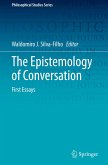The Morality of Knowledge in Conversation
Herausgeber: Stivers, Tanya; Steensig, Jakob; Mondada, Lorenza
The Morality of Knowledge in Conversation
Herausgeber: Stivers, Tanya; Steensig, Jakob; Mondada, Lorenza
- Gebundenes Buch
- Merkliste
- Auf die Merkliste
- Bewerten Bewerten
- Teilen
- Produkt teilen
- Produkterinnerung
- Produkterinnerung
Demonstrates how we monitor others' rights to, and responsibilities for, knowledge in conversation, and their consequences for affiliation.
Andere Kunden interessierten sich auch für
![The Morality of Knowledge in Conversation The Morality of Knowledge in Conversation]() The Morality of Knowledge in Conversation47,99 €
The Morality of Knowledge in Conversation47,99 €![The Epistemology of Conversation The Epistemology of Conversation]() The Epistemology of Conversation98,99 €
The Epistemology of Conversation98,99 €![Art as Cognition: How Gist Reframes the Aesthetic Experience as Conversation Art as Cognition: How Gist Reframes the Aesthetic Experience as Conversation]() Dena ShottenkirkArt as Cognition: How Gist Reframes the Aesthetic Experience as Conversation67,99 €
Dena ShottenkirkArt as Cognition: How Gist Reframes the Aesthetic Experience as Conversation67,99 €![The Epistemology of Conversation The Epistemology of Conversation]() The Epistemology of Conversation98,99 €
The Epistemology of Conversation98,99 €![On the Genealogy of Morals On the Genealogy of Morals]() Friedrich NietzscheOn the Genealogy of Morals11,99 €
Friedrich NietzscheOn the Genealogy of Morals11,99 €![Between the Said and the Unsaid Between the Said and the Unsaid]() Yvanka B. RaynovaBetween the Said and the Unsaid52,05 €
Yvanka B. RaynovaBetween the Said and the Unsaid52,05 €![A Week's Conversation On the Plurality of Worlds: By Monsieur Fontenelle. Translated From the Last Paris Edition, Wherein Are Many Improvements Throug A Week's Conversation On the Plurality of Worlds: By Monsieur Fontenelle. Translated From the Last Paris Edition, Wherein Are Many Improvements Throug]() AnonymousA Week's Conversation On the Plurality of Worlds: By Monsieur Fontenelle. Translated From the Last Paris Edition, Wherein Are Many Improvements Throug30,99 €
AnonymousA Week's Conversation On the Plurality of Worlds: By Monsieur Fontenelle. Translated From the Last Paris Edition, Wherein Are Many Improvements Throug30,99 €-
-
-
Demonstrates how we monitor others' rights to, and responsibilities for, knowledge in conversation, and their consequences for affiliation.
Produktdetails
- Produktdetails
- Verlag: Cambridge University Press
- Seitenzahl: 356
- Erscheinungstermin: 24. April 2012
- Englisch
- Abmessung: 235mm x 157mm x 24mm
- Gewicht: 666g
- ISBN-13: 9780521194549
- ISBN-10: 0521194547
- Artikelnr.: 32275875
- Herstellerkennzeichnung
- Libri GmbH
- Europaallee 1
- 36244 Bad Hersfeld
- gpsr@libri.de
- Verlag: Cambridge University Press
- Seitenzahl: 356
- Erscheinungstermin: 24. April 2012
- Englisch
- Abmessung: 235mm x 157mm x 24mm
- Gewicht: 666g
- ISBN-13: 9780521194549
- ISBN-10: 0521194547
- Artikelnr.: 32275875
- Herstellerkennzeichnung
- Libri GmbH
- Europaallee 1
- 36244 Bad Hersfeld
- gpsr@libri.de
Introduction; 1. Knowledge, morality and affiliation in social interaction
Tanya Stivers, Lorenza Mondada and Jakob Steensig; Part I. Affiliational
Consequences of Managing Epistemic Asymmetries: 2. The management of
knowledge discrepancies and of epistemic changes in institutional
interactions Lorenza Mondada; 3. Giving support to the claim of epistemic
primacy: yo-marked assessments in Japanese Kaoru Hayano; 4. Morality and
question design: 'of course' as contesting a presupposition of askability
Tanya Stivers; 5. Addressing epistemic incongruence in question-answer
sequences through the use of epistemic adverbs Trine Heinemann, Anna
Lindström and Jakob Steensig; 6. The epistemics of make-believe Jack
Sidnell; Part II. Epistemic Resources for Managing Affiliation and
Alignment: 7. Territories of knowledge, territories of experience: empathic
moments in interaction John Heritage; 8. The terms of not knowing and
social affiliation Leelo Keevallik; 9. Proposing shared knowledge as a
means of pursuing agreement Birte Asmuß; 10. Ways of agreeing with negative
stance taking Auli Hakulinen and Marja-Leena Sorjonen; 11. Epistemics and
embodiment in the interactions of very young children Mardi Kidwell; Part
III. Toward a Theory: 12. Sources of asymmetry in human interaction:
enchrony, status, knowledge and agency N. J. Enfield.
Tanya Stivers, Lorenza Mondada and Jakob Steensig; Part I. Affiliational
Consequences of Managing Epistemic Asymmetries: 2. The management of
knowledge discrepancies and of epistemic changes in institutional
interactions Lorenza Mondada; 3. Giving support to the claim of epistemic
primacy: yo-marked assessments in Japanese Kaoru Hayano; 4. Morality and
question design: 'of course' as contesting a presupposition of askability
Tanya Stivers; 5. Addressing epistemic incongruence in question-answer
sequences through the use of epistemic adverbs Trine Heinemann, Anna
Lindström and Jakob Steensig; 6. The epistemics of make-believe Jack
Sidnell; Part II. Epistemic Resources for Managing Affiliation and
Alignment: 7. Territories of knowledge, territories of experience: empathic
moments in interaction John Heritage; 8. The terms of not knowing and
social affiliation Leelo Keevallik; 9. Proposing shared knowledge as a
means of pursuing agreement Birte Asmuß; 10. Ways of agreeing with negative
stance taking Auli Hakulinen and Marja-Leena Sorjonen; 11. Epistemics and
embodiment in the interactions of very young children Mardi Kidwell; Part
III. Toward a Theory: 12. Sources of asymmetry in human interaction:
enchrony, status, knowledge and agency N. J. Enfield.
Introduction; 1. Knowledge, morality and affiliation in social interaction
Tanya Stivers, Lorenza Mondada and Jakob Steensig; Part I. Affiliational
Consequences of Managing Epistemic Asymmetries: 2. The management of
knowledge discrepancies and of epistemic changes in institutional
interactions Lorenza Mondada; 3. Giving support to the claim of epistemic
primacy: yo-marked assessments in Japanese Kaoru Hayano; 4. Morality and
question design: 'of course' as contesting a presupposition of askability
Tanya Stivers; 5. Addressing epistemic incongruence in question-answer
sequences through the use of epistemic adverbs Trine Heinemann, Anna
Lindström and Jakob Steensig; 6. The epistemics of make-believe Jack
Sidnell; Part II. Epistemic Resources for Managing Affiliation and
Alignment: 7. Territories of knowledge, territories of experience: empathic
moments in interaction John Heritage; 8. The terms of not knowing and
social affiliation Leelo Keevallik; 9. Proposing shared knowledge as a
means of pursuing agreement Birte Asmuß; 10. Ways of agreeing with negative
stance taking Auli Hakulinen and Marja-Leena Sorjonen; 11. Epistemics and
embodiment in the interactions of very young children Mardi Kidwell; Part
III. Toward a Theory: 12. Sources of asymmetry in human interaction:
enchrony, status, knowledge and agency N. J. Enfield.
Tanya Stivers, Lorenza Mondada and Jakob Steensig; Part I. Affiliational
Consequences of Managing Epistemic Asymmetries: 2. The management of
knowledge discrepancies and of epistemic changes in institutional
interactions Lorenza Mondada; 3. Giving support to the claim of epistemic
primacy: yo-marked assessments in Japanese Kaoru Hayano; 4. Morality and
question design: 'of course' as contesting a presupposition of askability
Tanya Stivers; 5. Addressing epistemic incongruence in question-answer
sequences through the use of epistemic adverbs Trine Heinemann, Anna
Lindström and Jakob Steensig; 6. The epistemics of make-believe Jack
Sidnell; Part II. Epistemic Resources for Managing Affiliation and
Alignment: 7. Territories of knowledge, territories of experience: empathic
moments in interaction John Heritage; 8. The terms of not knowing and
social affiliation Leelo Keevallik; 9. Proposing shared knowledge as a
means of pursuing agreement Birte Asmuß; 10. Ways of agreeing with negative
stance taking Auli Hakulinen and Marja-Leena Sorjonen; 11. Epistemics and
embodiment in the interactions of very young children Mardi Kidwell; Part
III. Toward a Theory: 12. Sources of asymmetry in human interaction:
enchrony, status, knowledge and agency N. J. Enfield.









